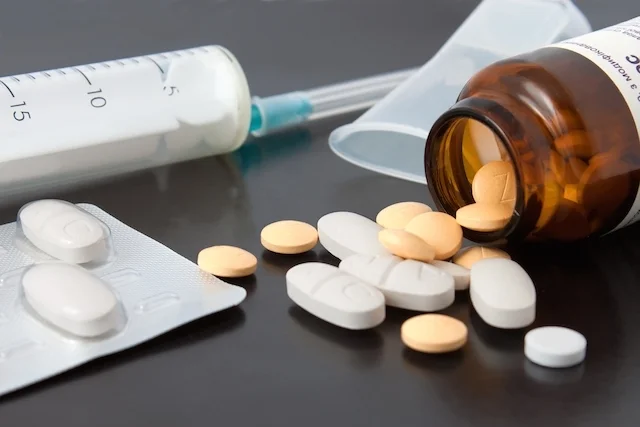High blood sugar, or hyperglycemia, can be a daunting challenge, especially for those diagnosed with diabetes. This condition demands a disciplined lifestyle and a thorough understanding of the medications available to manage it effectively. In this blog, we’ll explore various medicines for high blood sugar, discussing their mechanisms, benefits, and essential considerations.
Contents
When To Consider Medicines For High Blood Sugar?
 Medications for high blood sugar are a crucial aspect of managing diabetes and preventing the complications associated with uncontrolled blood sugar levels. Here are some key points to consider when deciding whether to start medications for high blood sugar:
Medications for high blood sugar are a crucial aspect of managing diabetes and preventing the complications associated with uncontrolled blood sugar levels. Here are some key points to consider when deciding whether to start medications for high blood sugar:
- Blood Sugar Levels Consistently Above the Target Range
If your blood glucose readings are consistently above the target range set by your healthcare provider, despite lifestyle changes such as diet and exercise, medication might be necessary.
- A1C Levels
The A1C test measures your average blood sugar levels over the past 2-3 months. An A1C level of 6.5% or higher on two separate tests typically indicates diabetes. Depending on the A1C level, your doctor might recommend starting medication.
- Presence of Diabetes-Related Complications
If there are signs of diabetes-related complications, such as neuropathy, retinopathy, or kidney issues, medications might be necessary to prevent further damage.
- Inability to Control Blood Sugar with Lifestyle Changes Alone
If you have made significant lifestyle changes but still struggle to control your blood sugar levels, medications might be needed to aid in this control.
- Pregnancy
For women with gestational diabetes or pre-existing diabetes who are pregnant, medication might be necessary to control blood sugar levels to prevent complications for both the mother and the baby.
- Individual Health Goals and Concerns
Personal preferences, health goals, and concerns also play a role in deciding to start medications. Some individuals may prefer to try intensive lifestyle changes first, while others may opt for medications to gain quicker control over their blood sugar levels.
It’s important to remember that starting medications should be made in consultation with a healthcare provider. They can consider all these factors in the context of your overall health and medical history.
What Is The Best Medicine For High Blood Sugar?
 Determining the “best” medicine for high blood sugar largely depends on individual factors including the type of diabetes, the patient’s overall health, other medical conditions, and how high the blood sugar levels are. Here is an overview of commonly used medicines for high blood sugar:
Determining the “best” medicine for high blood sugar largely depends on individual factors including the type of diabetes, the patient’s overall health, other medical conditions, and how high the blood sugar levels are. Here is an overview of commonly used medicines for high blood sugar:
Metformin
Metformin is often the first-line medication prescribed for Type 2 diabetes. It works by reducing the amount of glucose that your liver releases into your bloodstream and by making your body cells more responsive to insulin. This drug has the benefit of not causing weight gain and may even lead to a slight weight loss. It’s known for its cardiovascular benefits and is generally well-tolerated, although some individuals may experience gastrointestinal side effects.
Sulfonylureas
This class of drugs, which includes glipizide, glyburide, and glimepiride, helps your body secrete more insulin. They are among the oldest diabetes drugs still in use and can effectively lower blood sugar levels. However, they may cause weight gain and have a risk of causing low blood sugar levels (hypoglycemia), especially if meals are skipped.
Meglitinides
These medications, including repaglinide and nateglinide, also stimulate the pancreas to secrete more insulin, similar to sulfonylureas, but they work faster and the duration of their effect in the body is shorter. They are taken before meals and can help control blood sugar spikes after eating. Like sulfonylureas, they can cause weight gain and hypoglycemia.
Thiazolidinediones
Drugs like pioglitazone and rosiglitazone make the body’s tissues more sensitive to insulin. This class of medication can be effective in lowering blood glucose levels but can have side effects including weight gain, and fluid retention. And potentially increased risk of heart problems.
DPP-4 Inhibitors
Dipeptidyl peptidase-4 inhibitors, such as sitagliptin, saxagliptin, and linagliptin, work by blocking the action of an enzyme that destroys the hormone incretin. Incretin helps the body produce more insulin when needed and reduces the amount of glucose being produced by the liver when it’s not needed. These drugs are less likely to cause weight gain and hypoglycemia.
GLP-1 Receptor Agonists
Drugs in this category, including exenatide and liraglutide, mimic the incretin hormones that the body usually produces naturally to stimulate insulin release after meals. They slow digestion and help lower blood sugar levels. These medications not only aid in blood sugar control but may also lead to weight loss and have been shown to reduce cardiovascular risk in some patients.
SGLT2 Inhibitors
Sodium-glucose cotransporter-2 inhibitors, like canagliflozin and empagliflozin, work by preventing the kidneys from reabsorbing glucose back into the blood. Instead, the glucose is excreted in the urine. These medications can lower blood sugar effectively and also have the benefit of lowering blood pressure and promoting weight loss. They have been shown to have cardiovascular and kidney benefits but can increase the risk of urinary tract and genital infections.
Insulin Therapy
When blood sugars are very high or if other medications are not sufficient, insulin therapy might be necessary. There are various types of insulin, ranging from rapid-acting insulins to long-acting ones. The choice of insulin type depends on the individual’s blood sugar patterns, lifestyle, and meal schedule. Insulin therapy is tailored to each individual’s needs and can be very effective in controlling blood sugar levels. However, it requires careful monitoring and dosing adjustments.
The “best” medication for any individual depends on various factors, including:
- How much the blood sugar needs to be lowered?
- The presence of other health conditions like heart disease, kidney disease, or liver problems.
Individuals need to work closely with their healthcare provider to choose the most appropriate medication based on their specific health needs and circumstances. It’s also common for people with Type 2 diabetes to need more than one type of medication as the disease progresses over time.
Benefits And Risks Of Medicines For High Blood Sugar
 Managing high blood sugar with medications is a balancing act between the benefits of controlling blood glucose levels and the potential risks or side effects associated with these medicines. Here’s an overview of the benefits and risks:
Managing high blood sugar with medications is a balancing act between the benefits of controlling blood glucose levels and the potential risks or side effects associated with these medicines. Here’s an overview of the benefits and risks:
Benefits
- Improved Blood Sugar Control: The primary benefit of these medications is the reduction in blood sugar levels. It helps in managing diabetes effectively.
- Reduction in Diabetes Complications: By keeping blood sugar levels within a target range, the risk of complications such as neuropathy, retinopathy, kidney disease, and heart disease is significantly reduced.
- Improved Quality of Life: Better control of blood sugar levels can lead to increased energy levels, improved mood, and overall better quality of life.
- Weight Management: Some medications, like GLP-1 receptor agonists and SGLT2 inhibitors, can aid in weight loss. This is often beneficial for individuals with Type 2 diabetes.
- Cardiovascular Benefits: Certain diabetes medications have been shown to have protective effects on the heart and blood vessels, reducing the risk of cardiovascular events.
- Flexibility in Treatment: There are various types of medications available. And, allowing for personalized treatment plans tailored to individual needs and lifestyles.
Risks
- Hypoglycemia (Low Blood Sugar): Medications that increase insulin production, like sulfonylureas and meglitinides, can sometimes cause blood sugar to drop too low, a condition known as hypoglycemia.
- Weight Gain: Some medications, particularly insulin, sulfonylureas, and thiazolidinediones, can lead to weight gain.
- Gastrointestinal Issues: Medications such as metformin can cause nausea, diarrhea, and other gastrointestinal discomfort, especially when treatment is initiated.
- Increased Risk of Infections: SGLT2 inhibitors can increase the risk of urinary tract and genital infections.
- Cardiovascular Risks: Some older diabetes medications, particularly certain thiazolidinediones, have been linked to increased risk of heart failure and other heart issues.
- Cost and Accessibility: Some of the newer and more effective medications can be expensive and may not be covered by all insurance plans.
- Injection-Related Issues: Medications that require injections, like insulin and GLP-1 receptor agonists, can be challenging for some patients and carry a risk of injection site reactions.
- Long-Term Risks: The long-term risks of some newer diabetes medications are still being studied. And there might be concerns that are not yet fully understood.
Overall, the choice of medication is often based on individual health profiles, the presence of other medical conditions, lifestyle factors, and personal preferences. Regular follow-ups and adjustments in medication types or dosages are common in diabetes management.
Conclusion
In conclusion, medicines for high blood sugar are a vital aspect of controlling diabetes and preventing its complications. Various medications are available, each with its benefits, such as improved blood sugar control, reduced risk of long-term complications, and potential weight management. However, it’s important to be aware of potential risks and other side effects. The choice of medication should be tailored to individual needs.
Remember, effective diabetes management is a combination of the right medication, lifestyle changes, and ongoing monitoring. Do you want to get rid of diabetes? Join our online diabetes treatment program and reverse Diabetes naturally through lifestyle changes such as a Personalized Diet plan, Exercise, Yoga, dieticians, and health coaches.

